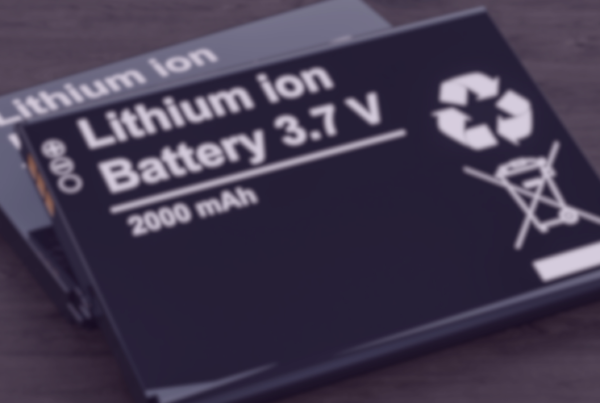To coincide with America Recycles Day on Nov. 15, 2022, ISRI is launching a series examining innovation in the recycled materials industry. This is the first article in the series.
During the pandemic, Kari Bliss, sustainability principal at PADNOS, received a call from Michigan’s Department of Environment, Great Lakes, and Energy (EGLE) concerning an issue from Ford Motor Co. In April 2020, soon after the COVID-19 pandemic hit the U.S., Ford expanded its efforts to design and produce medical equipment and supplies for healthcare workers, first responders, and patients. But over time, with the introduction of COVID-19 vaccines and lowering restrictions, the company was left with thousands of personal protective equipment (PPE) gowns and didn’t know what to do with them.
“Unfortunately, there’s no easy way to recycle such a large number of these gowns,” Bliss explains. Luckily, she had a plan—take the materials to Sustainability City. Located within PADNOS’ Grand Rapids, Mich., facility lies a dedicated innovation space that the company uses to help solve today’s biggest sustainability challenges.
“Through various tests, our team found a solution to take the PPE gowns and produce a renewable source of high-quality materials for manufacturers that will go into everyday items people depend on,” Bliss says. “Sustainability City allows for work that doesn’t happen with day-to-day handling.”
The Sustainability City team pilots new strategies to recycle more material, and more types of material, more efficiently. Through the work, the team provides a renewable source of materials to local Southwest Michigan manufacturers.
“We realized we needed a space where we could take our time looking at materials and run trials and tests to make better decisions and products,” Bliss says. “In addition to using the space to analyze materials, we wanted to bring in the equipment that we recommend to our customers so they can see it work before making a commitment. Over time we’ve added equipment and new technologies into the space.”
With equipment designed for customer-scale rather than industry-scale, visitors can see exactly how their equipment will be used and perform onsite. “When you talk about these projects theoretically, it can be hard for people to wrap their heads around it and get buy-in from stakeholders,” Bliss says. “This space allows us to bring in those decision-makers and layout and run their materials, it’s a hands-on experience.”
With more than 100 years in the industry, PADNOS has built a wide network of customers, recycling forums, and sustainability groups that provide a pulse on the market and its needs and drivers. That pool of knowledge helps the company find viable, sustainable homes for materials.
 The team has tackled a variety of challenges using Sustainability City including the case of the white pharmacy pill bottle. High density polyethylene used to make pill bottles can be recycled in a typical recycling bin but is difficult for retail chains to recycle due to the large amounts they collect and the various attachments like taped paper instructions, aluminum foil with adhesives, cotton, and desiccant packs).
The team has tackled a variety of challenges using Sustainability City including the case of the white pharmacy pill bottle. High density polyethylene used to make pill bottles can be recycled in a typical recycling bin but is difficult for retail chains to recycle due to the large amounts they collect and the various attachments like taped paper instructions, aluminum foil with adhesives, cotton, and desiccant packs).
Testing the material at Sustainability City allowed the team to work collaboratively with the entire value chain to link the supplier with PADNOS’ processing team and the final end-users of this unique material. The team approached the situation from all angles of the value chain.
Not only did they develop a collection system to help retail stores bring in more material and decrease their fuel emissions, but they also invested in a top-of-the-line extrusion system with laser filtration that cleans all the impurities from the product, ensuring a source of high-quality materials for manufacturers. By working with local furniture manufacturers, PADNOS found renewable uses for the product as a binding agent with metal dust to create a counterweight to help keep file cabinets from tipping.
 Bliss is proud of the innovative technologies and teamwork that helped make the project a success. “The laser filtration system allowed us to clean contamination from the plastic without using large volumes of water or chemicals. We were able to secure viable markets within the region of generation, reducing carbon emissions,” she says.
Bliss is proud of the innovative technologies and teamwork that helped make the project a success. “The laser filtration system allowed us to clean contamination from the plastic without using large volumes of water or chemicals. We were able to secure viable markets within the region of generation, reducing carbon emissions,” she says.
Bliss anticipates Sustainability City will evolve as new technologies and equipment continue to be introduced to the recycled materials industry. One piece of technology coming into the innovation space is a cardboard perforator, a machine that can turn cardboard into eco-friendly and free packaging material. “When you run the cardboard through the machine you get these fluffy waffle shapes that can be used for packaging in place of plastic bubble wrap,” Bliss explains. “This way our customers have a renewable source of packaging that they can use from their own materials.”
According to Bliss, sustainability and innovation align well with the company’s purpose. “We will continue to find ways to innovate, lead, and make a positive impact in this world, and that means making it sustainable. You’re continually improving and coming up with new innovations to make things possible that were previously impossible, we’re making the best uses of our resources whether that’s people, or environmental concerns, or the recycled materials themselves.”
Photos Courtesy of PADNOS.










